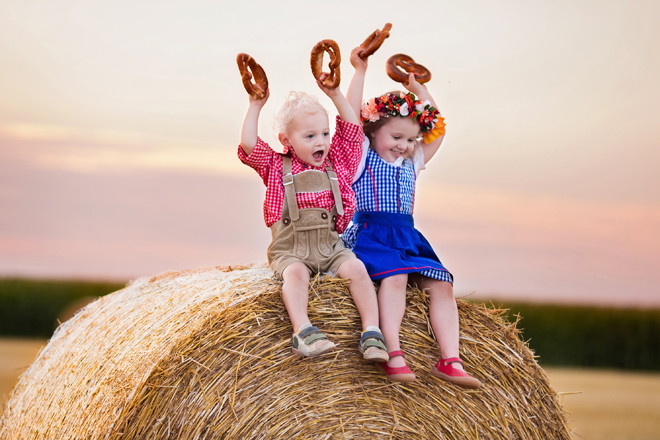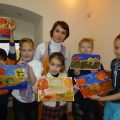The traditions of upbringing in Russia are a whole layerpagan foundations and God's commandments, thanks to which the foundations of the upbringing of children: the veneration of parents, respect for old age, the performance of duty to the Motherland were inherited. Photo: Getty Images
Photo: Getty Images
Protect nature
The first thing that was instilled in children from childhood wascaring attitude towards nature. "The earth-nurse gives a harvest, and if there is none, then the whole family will perish," they used to say in the old days and always protected nature from senseless destruction. Now these traditions are being revived within the framework of environmental education, however, the former harmony that used to exist between nature and man can no longer be achieved.
Be hospitable
In his notes, Nikolai Karamzin wrote thatOur ancestors, when leaving home, always left food for a guest on the table and did not lock the doors. Of course, the century is not the same and there are many who want to profit from someone else's goods that are lying around, but at the same time, the traditions of hospitality are gradually disappearing from Russian life. More and more often, meetings with friends and birthdays are transferred to cafes and restaurants, and children have stopped inviting classmates to their homes and enjoying guests.
Love the Fatherland
Civic education is not the same now as it used to be.earlier. From an early age, children were brought up to respect the authorities - first, to honor elders, leaders, then princes. Therefore, Russian soldiers always fought desperately for their land and there was no nation in the world that loved their Fatherland so much. "One's own land is dear even in sorrow" - they used to say in the old days, and modern people only think about how to change their place of residence. Patriotic education, learning the anthem, studying history and state symbols are not very interesting for many people today, but it is from these basics that love for the Motherland begins. Traditions of the correct attitude to one's land, family and Motherland have probably been preserved only in the Cossacks.
Commandments for parents
The rules written by the monk Sylvester in "Domostroy" became the only law that defined the norms of behavior between husband and wife, parents and children in Rus'. A photo: Getty Images A lot of attention in drafting this document was paid by the monk to the upbringing of children. And, as we remember, the whole medieval pedagogy was built on corporal punishments - "afraid, therefore, respects." The responsibility to raise worthy children from children was imputed to the father and mother, and only they were responsible for the growth of their children. Domostroy propagandized not only punishment, but also love and care for children, as well as an example of right life and actions on the part of parents, only then all the earthly and unearthly benefits will be available to children in adulthood. However, parents were advised to hide their feelings: they do not show love and affection deeply and openly, but to be to children as harshly as possible-it is only possible to cultivate respect for oneself and reverence in them. "If you punish him with a rod, he will not die, but it will be healthier, because you, executing his body, you deliver his soul from death "- was written in an old textbook on pedagogy. Otherwise, children will grow spoiled and in their old age will bring only sorrow and grief. The love of children and parents in those times was measured by deeds, not words. Children should have loved their father and mother only because they gave birth to them, and they in turn were supposed to give the child the work of his life, a dowry, to provide food and shelter.
A photo: Getty Images A lot of attention in drafting this document was paid by the monk to the upbringing of children. And, as we remember, the whole medieval pedagogy was built on corporal punishments - "afraid, therefore, respects." The responsibility to raise worthy children from children was imputed to the father and mother, and only they were responsible for the growth of their children. Domostroy propagandized not only punishment, but also love and care for children, as well as an example of right life and actions on the part of parents, only then all the earthly and unearthly benefits will be available to children in adulthood. However, parents were advised to hide their feelings: they do not show love and affection deeply and openly, but to be to children as harshly as possible-it is only possible to cultivate respect for oneself and reverence in them. "If you punish him with a rod, he will not die, but it will be healthier, because you, executing his body, you deliver his soul from death "- was written in an old textbook on pedagogy. Otherwise, children will grow spoiled and in their old age will bring only sorrow and grief. The love of children and parents in those times was measured by deeds, not words. Children should have loved their father and mother only because they gave birth to them, and they in turn were supposed to give the child the work of his life, a dowry, to provide food and shelter.
Pros and cons of education under the laws of "Domostroy"
The methods of raising children at that time, of course,frighten. You could get a slap in the face or a spoon on the forehead for the slightest offense, even just because your father was in a bad mood. However, there were also positive aspects to upbringing in Rus'. Everything that parents did for them was only for one thing: to raise polite, obedient, hardworking children who respected their father and mother, honored traditions and religious norms. Parental care in Orthodox families was aimed at the well-being of children, and in turn, children reciprocated: they loved and appreciated their parents, looked after them in old age. And, of course, education. A literate person was worth his weight in gold, books were treasured and an intelligent person was always listened to attentively. Then there were no problems making children study. It was only a joy for them.









